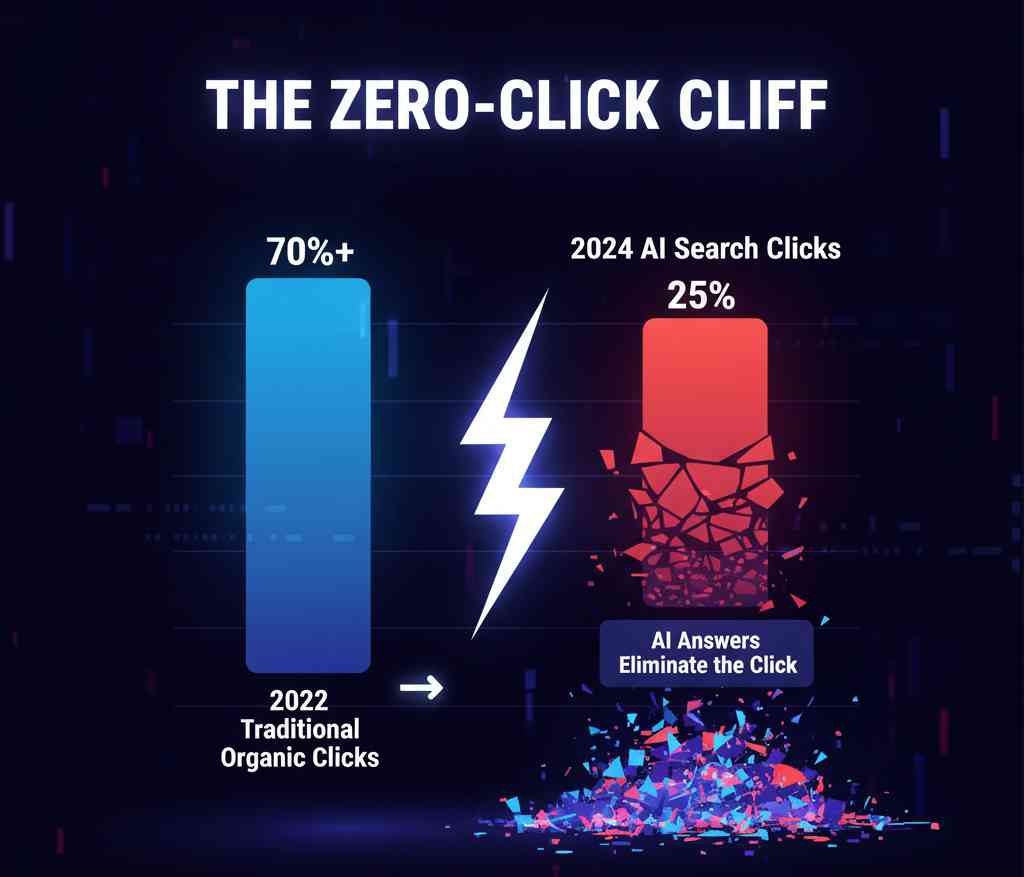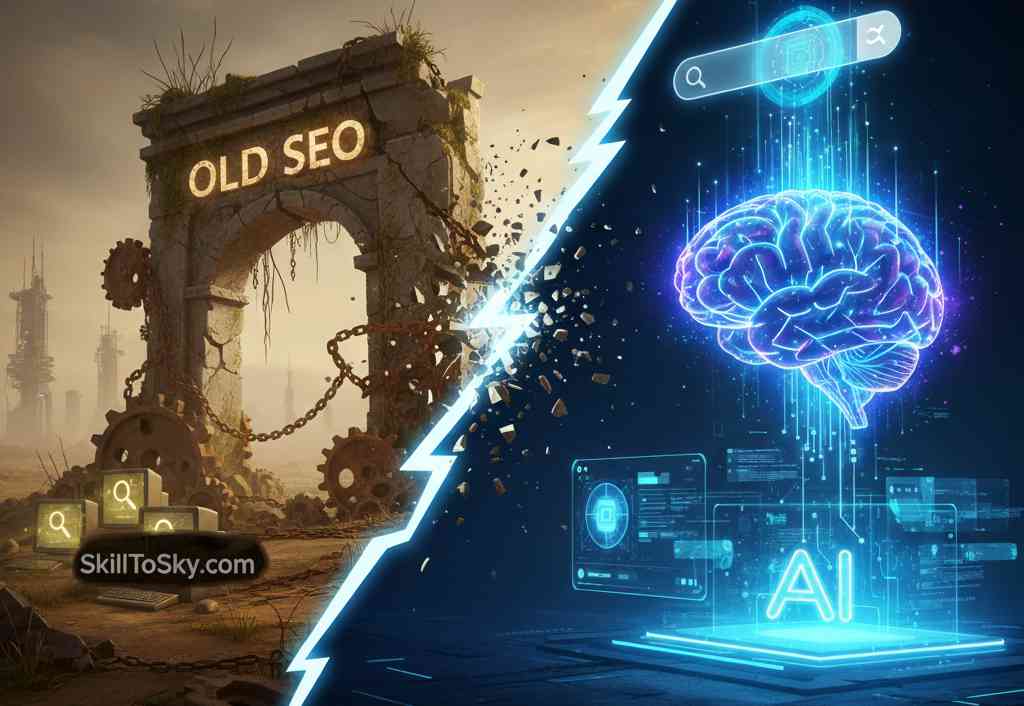I’m going to say something that might upset some people: everything you learned about SEO in the last five years is becoming obsolete. Fast.
And I say this as someone who’s been doing SEO for over a decade. I’ve ridden every wave – Panda, Penguin, mobile-first indexing, Core Web Vitals. I thought I’d seen it all. Then AI search showed up and changed the entire game.
Let me explain what’s happening and, more importantly, what you need to do about it.
The Death of the Blue Link
You know that feeling when you Google something and find the perfect answer right there in the search results? You get what you need without even clicking?
That’s happening more and more. And it’s not an accident.
Google’s AI Overviews, ChatGPT Search, Perplexity – they’re all designed to give you answers, not links. The traditional “10 blue links” search results page is dying. In its place? AI-generated summaries that pull from multiple sources and serve you exactly what you need.
Here’s the brutal truth: your carefully optimized blog post might be feeding AI’s answer without ever getting a click. You’re doing the work, AI is getting the credit, and you’re getting… nothing.
Why Traditional SEO Is Struggling
Let’s talk about what’s not working anymore:
Keywords Are Dead (Sort Of)
Remember when you’d stuff your content with exact-match keywords? “Best running shoes 2025” exactly like that, repeated 10 times?
Yeah, AI doesn’t care. AI understands context and intent. It knows that “what shoes should I buy for my marathon training” and “best running shoes 2025” are asking the same thing. Your keyword strategy? AI just made it irrelevant.
Only 5.4% of Google’s AI Overviews contain an exact query match. Think about that. All those hours spent on exact keyword matching – wasted.
Link Building Isn’t What It Was
Don’t get me wrong – links still matter. But not in the way they used to.
AI search engines care more about whether you’re mentioned as an authority than whether you have 500 backlinks. A single mention in a high-authority context can be worth more than dozens of traditional backlinks.
The game has shifted from “how many links” to “how trusted and relevant are you in your space.”
Content Length? Forget What You Heard
There’s this old SEO myth that longer content ranks better. So everyone started writing 3,000-word blog posts about topics that needed 500 words.
AI is killing this. When someone asks a question, AI looks for the best answer – not the longest one. A concise, accurate 600-word article can outperform a rambling 3,000-word piece that buries the answer in fluff.
Quality over quantity isn’t just a nice saying anymore. It’s survival.
What’s Actually Working in 2025
Okay, enough doom and gloom. Let’s talk about what IS working:
Intent Is Everything
Stop optimizing for keywords. Start optimizing for intent. What is the person actually trying to accomplish when they search for this?
Someone searching “best CRM software” might be:
- Researching options (informational intent)
- Ready to buy (transactional intent)
- Comparing specific tools (commercial investigation)
AI can tell the difference. Your content needs to match not just the keywords but the actual intent behind them. This means really understanding your audience, not just keyword data.
E-E-A-T Is No Longer Optional
Experience, Expertise, Authoritativeness, Trustworthiness. Google’s been talking about this for years. Now with AI, it’s critical.
AI pulls from sources it considers authoritative. If your content doesn’t demonstrate real expertise and experience, you’re invisible to AI search engines.
This means:
- Author bios that show real credentials
- Content written by people with actual experience in the field
- Clear sourcing and references
- Original research and insights, not regurgitated information
You can’t fake this. AI is pretty good at spotting content written by someone who doesn’t really know what they’re talking about.
User Experience Beats Everything
Here’s something that hasn’t changed: Google (and AI) wants to send people to sites that provide a good experience.
But what counts as “good” is evolving:
- Page speed – still crucial, maybe more than ever
- Mobile optimization – non-negotiable
- Easy navigation – users should find what they need quickly
- No intrusive ads or pop-ups – these are death in 2025
- Accessibility – this matters more than most people think
If your site is slow, cluttered, or difficult to use, AI won’t recommend it. Period.
The Rise of Zero-Click Searches

This is the part that keeps content creators up at night.
Zero-click searches are exactly what they sound like: someone searches, gets their answer from AI, and never clicks through to any website. They’re getting their information, but you’re getting nothing.
These are increasing. Fast. Some estimates suggest that over 60% of searches now end without a click to a website.
So what do you do? You can’t just give up on content creation.
Strategy 1: Be the Source
AI has to pull information from somewhere. Make your site the authoritative source that AI cites. Even if users don’t click, being cited builds authority and brand recognition.
Think of it like being quoted in the news. Most people won’t read the original source, but being cited still has value.
Strategy 2: Go Deeper
Create content that can’t be summarized in an AI overview. Detailed tutorials, interactive tools, original research, unique perspectives – these require clicks because AI can’t fully replicate the experience.
Strategy 3: Build Direct Relationships
SEO is becoming less about traffic and more about building an audience. Email lists, social media followers, direct relationships – these matter more than ever because they bypass search entirely.
The Search Landscape Is Fragmenting
Here’s something most people aren’t talking about: “search” doesn’t just mean Google anymore.
People are searching on:
- TikTok (especially Gen Z)
- YouTube
- Amazon
- ChatGPT
- Perplexity
Each platform has its own “SEO.” If you’re only optimizing for Google, you’re missing huge opportunities.
Young people especially are bypassing Google entirely. They’ll search TikTok for restaurant recommendations, Instagram for fashion advice, YouTube for tutorials. The dominance of traditional search engines is cracking.
What You Should Do Right Now
Let’s get practical. Here’s your action plan:
Audit Your Content for AI
Go through your top-performing content and ask:
- Does this demonstrate real expertise and experience?
- Is this unique, or could AI generate something similar?
- Am I answering the user’s intent or just targeting keywords?
- Would I cite this content if I were building an AI?
Be honest. If your content doesn’t pass this test, it’s time to rewrite or replace it.
Optimize for AI Citations
Structure your content to be easily parsed by AI:
- Clear, concise answers to specific questions
- Proper heading structure (H1, H2, H3)
- Bullet points and lists for easy scanning
- Data and statistics with proper sourcing
- Author credentials prominently displayed
Make it easy for AI to understand and cite your content.
Focus on Original Insights
AI can’t replicate original research, unique experiences, or novel perspectives. Create content that adds something genuinely new to the conversation.
Interview experts. Run surveys. Share case studies. Report on trends you’re seeing in your industry. This is what will differentiate you.
Build Topic Authority
Stop trying to rank for everything. Become THE authority on specific topics.
Own a niche. Go deep, not wide. When AI is looking for authoritative content on your topic, you want to be the obvious choice.
Diversify Your Traffic Sources
Stop putting all your eggs in the SEO basket. Build:
- An email list (still the best owned channel)
- Social media presence
- YouTube channel
- Podcast (audio is growing fast)
- Direct partnerships and collaborations
The goal is to be less dependent on any single traffic source, especially search engines you don’t control.
Long-Tail Keywords Are Your Friend
Here’s something that still works: long-tail keywords.
While AI is dominating broad searches, specific, detailed queries still drive clicks. Someone searching “SEO” might get an AI overview. Someone searching “how to optimize product pages for e-commerce sites selling handmade jewelry” is more likely to click through for detailed guidance.
Long-tail keywords also have less competition and higher conversion rates. They’re your secret weapon in the AI age.
The Technical Stuff Still Matters
Don’t abandon technical SEO fundamentals:
- Schema markup – helps AI understand your content structure
- XML sitemaps – ensures your content is found
- Fast page load times – critical for user experience
- Mobile responsiveness – more important than ever
- HTTPS – security is non-negotiable
- Core Web Vitals – user experience metrics that still matter
The technical foundation is still essential. Just don’t rely on it alone to rank.
Content That Works in 2025
Based on what’s actually working, here are content types that survive (and thrive) in the AI search era:
Interactive Tools and Calculators – AI can’t replicate functionality. A mortgage calculator or interactive tool provides value AI summaries can’t match.
Original Research and Data – Surveys, studies, proprietary data – this is gold. AI needs sources for data, and original research makes you the source.
Step-by-Step Tutorials with Visuals – Detailed guides with images, videos, or diagrams are hard for AI to fully summarize. Users need the visuals.
Case Studies and Real Examples – Specific stories and examples provide context AI summaries lose. They’re more engaging and credible.
Opinion and Analysis – Your unique take on industry trends can’t be replicated. Thought leadership content remains valuable.
Comparison Content – Detailed comparisons of products, services, or approaches help people make decisions and often require more detail than AI provides.
The Uncomfortable Truth
Here it is: some sites won’t survive this transition.
Content farms that churn out generic articles based on keyword research? Done. Sites built entirely on thin affiliate content? Dying. “Me too” content that just rewords what everyone else is saying? Obsolete.
But sites with real expertise, unique value, and genuine audience relationships? They’ll be fine. Actually, they’ll be better than fine – they’ll have less competition.
Looking Forward
The next 12-18 months are going to be wild. AI search is still evolving rapidly. What works today might not work tomorrow.
But some principles will remain:
- Create genuinely valuable content
- Build real expertise and authority
- Focus on user experience
- Diversify your traffic sources
- Adapt quickly to changes
The death of traditional SEO isn’t the death of organic visibility. It’s an evolution. The rules are changing, but the core principle remains: provide genuine value, and you’ll find an audience.
The question is: are you going to adapt, or are you going to keep doing what worked in 2018 and wonder why it’s not working anymore?
Your Move
Take stock of where you are right now. Is your SEO strategy built for 2018 or 2025? Are you optimizing for AI search or still chasing keyword rankings?
This isn’t about throwing out everything you know. It’s about evolving your approach to match how people actually search and find information today.
The sites winning in 2025 aren’t the ones with the most backlinks or the highest word counts. They’re the ones that genuinely help their audience and adapt to how search is changing.
What’s your plan? How are you adapting to AI search? Let me know in the comments – I’m curious what’s working for other people navigating this shift.

this is great